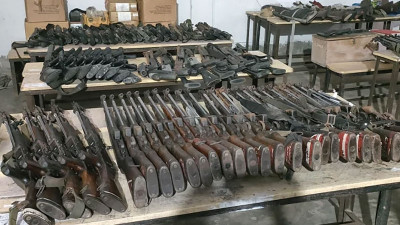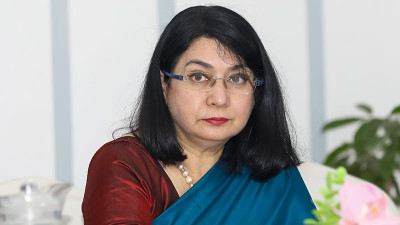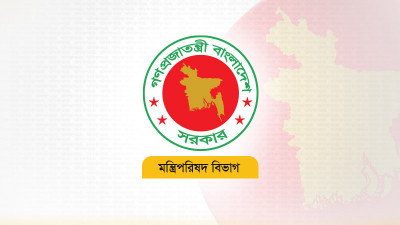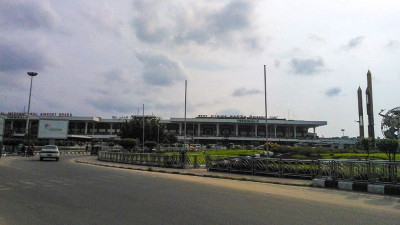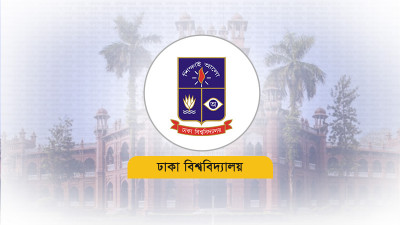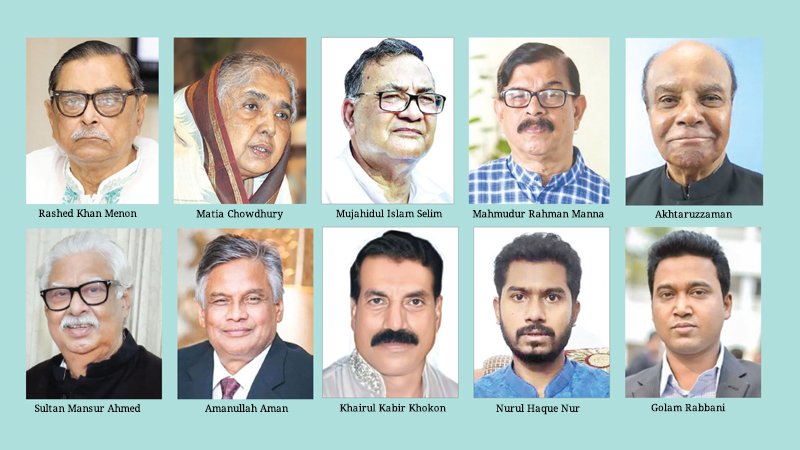 Photo: Bonik Barta
Photo: Bonik Barta Dhaka University Central Students' Union, commonly known
as DUCSU, has its highest elected representatives as the Vice President (VP)
and the General Secretary (GS). Former and current leaders of DUCSU have played
an active role in almost all democratic movements in Bangladesh's history,
including the Language Movement of 1952, the East Pakistan Education Movement
of 1962, the Mass Uprising of 1969, the Liberation War of 1971, and the
anti-autocratic movements of the 1990s. Many leaders also developed their
leadership through these mass movements. The latest student uprising, however,
has been an exception.
Political observers say that in this latest uprising,
former DUCSU leaders' positions were largely aligned with their respective
parties. While in the past, they often spoke in unison during political crises,
this time, the trend was mixed. Many played active roles in the uprising, while
others remained silent. Some openly supported their party's position, taking a
stance against the movement. Some have gone into hiding, while others have been
arrested.
Before independence, Rashed Khan Menon served as the VP
of DUCSU from 1963 to 1964. His role in the mass uprising of 1969 was outstanding.
This former leader of the Bangladesh Student Union is currently the President
of the Workers' Party of Bangladesh and is also involved in the politics of the
14-party alliance with the Awami League. Towards the end of the movement, on
August 4, the Awami League and the 14-party alliance proposed to sit down for
discussions with the coordinators of the anti-discrimination student movement,
with Rashed Khan Menon expected to be one of the representatives. However, the
students rejected this proposal.
Rashed Khan Menon is now in jail. On the morning of
August 5, he was arrested by the police as a suspect in the murder case of
garment worker Rubel in the Adabar area of the capital. He is currently in
remand in this case, which was filed on August 22.
During Rashed Khan Menon's time as DUCSU VP, Matia
Chowdhury was the General Secretary. This leader, who emerged from leftist
politics, gained recognition as the "Agni Kanya" before and after
Bangladesh's liberation struggle. She was arrested several times during the
regimes of Ziaur Rahman and Hussain Muhammad Ershad. 2018, she faced
significant criticism for derogatory remarks about quota movement activists.
During the 2024 protests, she was not seen making any statements for or against
the movement.
In the post-independence session of 1972-73, Mujahidul
Islam Selim became DUCSU's first VP from the Student Union. He was active in
many democratic movements during the 1980s. After his student political career,
he served as the founding General Secretary and later the Bangladesh
Agricultural Laborers' Association President. From the 1990s onward, he was
General Secretary of the Communist Party of Bangladesh (CPB) for many years. He
was last elected President during the CPB's tenth congress in 2012. He remains actively
involved in leftist politics.
At the beginning of August, he said in a media interview
that ordinary students' spontaneous participation in this uprising was greater
than in 1969. He also criticized Awami League General Secretary Obaidul Quader
for "instigating the student league" and condemned the actions of the
Chhatra League.
During Mujahidul Islam Selim's time, the General
Secretary was Mahbub Zaman, the then General Secretary of the Student Union.
After completing his studies in student politics, this brave freedom fighter
served as the president of the Bangladesh Jubo Union. Later, in the 1980s, he
left politics to become an entrepreneur in the information technology sector.
Although this former student leader has distanced himself from politics, he
serves as the founding chairperson of the active organization "We Are
71," which aims to build a society based on the spirit of the Liberation
War. He claims to have protested for those affected by the uprising and been
vocal on social media to support rational reforms to the quota system.
He told Bonik Barta about post-uprising Bangladesh,
"The students have fought against discrimination. There was even more
discrimination in the Pakistani state, which is why we fought for independence.
Therefore, the new Bangladesh should be reformed based on the ideals and spirit
of the Liberation War." From the beginning, Mahmudur Rahman Manna, a
two-time VP and current president of the Nagorik Oikya, has been vocal in
support of the students' movement. This former student leader started his
political career with the student wing of the Awami League and later became
involved in national politics, serving as the party's organizational secretary.
He played a significant role in forming the Jatiya Oikya Front before the 2018
general elections and contested the elections under the banner of the
"Dhaner Shish" symbol.
He is known to criticize the AL government in
contemporary national politics. Before the uprising, he supported the students'
movement. In a press conference at the beginning of August, he remarked,
"The death knell of the government has sounded," even though the
students had not yet put forth a one-point demand for the government's
resignation. During that time, he supported the movement in various meetings,
rallies, and political programs.
When asked about the recent student uprising, he told
Bonik Barta, "This movement was not just for the students; it was for the
entire nation. Therefore, as a member of this nation, I supported the movement.
However, I couldn't work on the front lines like the students. Age has caught
up with me! I hope the goals for which the uprising was organized will be
realized."
Akhtaruzzaman, elected as DUCSU VP in 1982 and served as
General Secretary twice was active on the streets during the anti-Ershad
movement in the 1980s. He was elected convener of the All-Party Student
Struggle Committee, leading the one-point demand for the government's
resignation. At that time, he rejected an offer to become a minister under
Ershad and had to serve time in prison. He later became a member of the central
executive committee and organizational secretary of the AL. In 2016, he served
as the chairman of the Gazipur District Council. Although he holds no official
position, he remains involved in AL politics. However, he has not taken an
active role in this movement. Reports from Gazipur indicate that he has been in
hiding since August 5.
Sultan Mohammad Mansur Ahmed was elected VP from the
Bangladesh Chhatra League in the 1989-90 parliament. This former student leader
resisted Bangabandhu's assassination and participated in the anti-autocratic
movements of the 1990s. A former organizational secretary of the Awami League,
he later became a prominent leader in the political alliance known as the Jatiya
Oikya Front, formed ahead of the eleventh national elections. He was elected as
a Member of Parliament under the "Dhaner Shish" symbol of that
alliance. Although his coalition rejected the results of that controversial
election, he took an oath despite going against the coalition's decision.
During the recent student uprising, he traveled to the
United States. Throughout the crisis in July and August, he was not seen making
any comments for or against anyone through any medium.
When asked about the role of former DUCSU leaders in the
recent movement, Dr. Kazi Mahbobor Rahman, an associate professor in the
Political Science Department at Dhaka University, told Bonik Barta, "There
were high expectations for former student leaders. However, many of them did not
take the positions that people expected. Regardless of the party they are
currently associated with, there was hope that, as former DUCSU leaders, they
would play a role in preserving the country's democratic system. Yet, over the
last 15 years, many have been absent from the autocratic environment. They were
contacted before the one-sided elections of 2014, 2018, and 2024, but despite
promising to stand by, they ultimately did not. This is a bitter experience for
the nation. They should have remembered their commitment and responsibility to
the nation."
In the 1990-91 parliament, Amanullah Aman and Khairul
Kabir Khokon were elected as the first VP and GS from the Jatiyatabadi Chhatra
Dal, respectively. Aman was elected as a Member of Parliament for the first
time in 1991 on a BNP nomination, and later, he was elected again in 1996 and
2001. He served as the Minister of State for Labor and Employment during
various terms of the BNP. He currently holds the advisory position of the BNP
Chairperson and also serves as the convenor of the North Dhaka Metropolitan
BNP. Khairul Kabir Khokon, who served as GS alongside Aman, is now the Senior
Joint Secretary General of the BNP. He was elected as a BNP Member of
Parliament in a by-election in 2005.
During the movement, on July 16, Khairul Kabir Khokon, on
behalf of the 1990 DUCSU and the All-Party Student Alliance leaders, issued a
statement expressing anger over the attacks on students demanding quota
reforms. Meanwhile, a case was filed against Amanullah Aman for participating
in the anti-discrimination student movement.
The last DUCSU VP, Nurul Haque Nur, also played a
prominent role in supporting the movement's demands. He was elected VP of the
Student Rights Council in 2019 and currently serves as the Student, Youth, and
Expatriate Rights Council's coordinator and president of his own political
party, the Gono Odhikar Parishad. A significant portion of the coordinators of
the anti-discrimination student movement consists of former and current leaders
of his organization. During this movement, he was arrested in two separate
cases related to incidents of violence in the capital. While in custody, he was
subjected to torture during interrogation.
When asked about the situation, he told Bonik Barta,
"I have not yet fully recovered from the ordeal of torture. However, I
have no regrets because we have been freed. Moreover, my suffering is nothing
compared to the sacrifices made by those who became martyrs."
During Nur's tenure, the GS was Golam Rabbani, the
then-general secretary of the student wing of the Awami League. However, he was
expelled from his position following numerous allegations of wrongdoing and
corruption. One of the major accusations against him was that he demanded a
commission from the funding allocated for development projects at Jahangirnagar
University (JU). It is reported that he is currently working in a high position
at a private company.
Regarding his role in the movement, he said to Bonik
Barta on August 1, "As a former general secretary of the student wing, I
stand with the Awami League. I have been with them and will continue to be in
the future. We former leaders are determined to thwart the conspiracies of the
Jamaat-BNP from our respective positions."
When asked about the role of DUCSU leaders in the student
uprising, Dr. Tanzim Uddin Khan, a professor in the Department of International
Relations at Dhaka University, told Bonik Barta, "Some former VPs and GSs
have become leaders of the ruling party and have supported the government’s stance.
Another group has been outside power and naturally aligned with their party's
position. Towards the end, we saw that some were trying to take a stance among
themselves, primarily within the context of their political parties. There has
been no independent position taken by the former VPs and GSs of DUCSU. Former
student leaders outside of political parties have also not been seen in active
roles."
It is worth mentioning that the first DUCSU election was
held three years after the establishment of Dhaka University in 1921, with
Mamtaz Uddin Ahmed and Jogendranath Sengupta elected as the first VP and GS,
respectively. For 46 years until 1970, DUCSU elections were held regularly, but
post-independence, they became irregular. The last DUCSU election took place in
2019 after a gap of 27 years, and since then, the student parliament of Dhaka
University has once again been without leadership.

